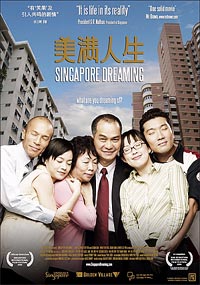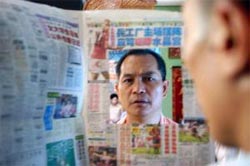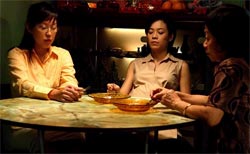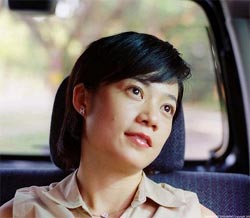We Are Family: 2007 San Francisco International Film Festival (Part 5)
 |
"We wanted to present Singapore family life today -- which is quite screwed-up and dysfunctional."
-- Yen Yen Woo
I must give kudos to my friends at the Yahoo IN Film Group -- if I didn't score an extra ticket from them, I would have missed what turned out to be my favorite film from this year's festival. The synopsis for this film in the festival program gave me the impression that this was one of those cutesy, cross-generational family dramas in which all complications are wrapped up neatly and resolved by the end. I couldn't have been more wrong.
The directors Yen Yenn Woo and Colin Goh were at my screening, and in their introduction to this film, they mentioned that they believe it mirrors the current state of family life in Singapore. Uncle Loh is a loan collector with dreams of hitting it big and moving into the latest modern housing, even as he tramps around his home in tanktop and briefs, cutting out potential winning lottery numbers from the newspaper. His ever-tolerant wife puts on her best smile and makes herbal tea for everyone, while his two children, daughter Mei and son Seng, vie for his approval. Mei is obsessed with money and must put up with a demeaning job working for a real estate magnate even as a baby is on the way, while her hapless husband CK, fresh from the army and with no idea of how to live a working man's life, makes a go of it trying to sell insurance to his old high school classmates. Seng is back from the States, having graduated from a technical college in Idaho no one has heard of, and trying to hide the fact from the family and his steadfast girlfriend Irene that he's really a slacker who has no chance of living up to the family's belief that he's the prodigal son.
 |
In form and plot, the film resembles one of Ang Lee's early projects, and the finale is very Ang-ish, as an elder member of the family effectively has the last word (think of the ends of Wedding Banquet and Eat, Drink, Man, Woman), but in tone and presentation, this has more in common with the work of Taiwanese director Edward Yang, who takes a hatchet to middle-class society and exposes the festering hurts underneath in his social comedies (A Confucian Confusion, Mahjong). Rowdy and sometimes vulgar, Singapore Dreaming touches on many of the foibles of modern Singapore (and modern Asia in general) -- the endearing crassness of the nouveau riche as they seek out the latest status-symbol credit cards, SUVs, and domiciles, the sterility of modern office life, the snobbery that goes on between the middle class and their Southeast Asian maids, social lies compounded upon exaggerations all in the name of saving face.
 |
 |
As far as I know, this one hasn't been picked up for distribution in the U.S. yet, but I can't imagine it'll be too long before it happens -- if there's any country out there that can get into the whole "dysfunctional family" thing, it's us. And you have to like any film that has a director like Goh, who had some very useful advice for anyone who finds him or herself in the middle of an ugly spat: "If you're about to argue, go out and eat. After a good meal, the argument just doesn't seem important any more."


0 Comments:
Post a Comment
<< Home